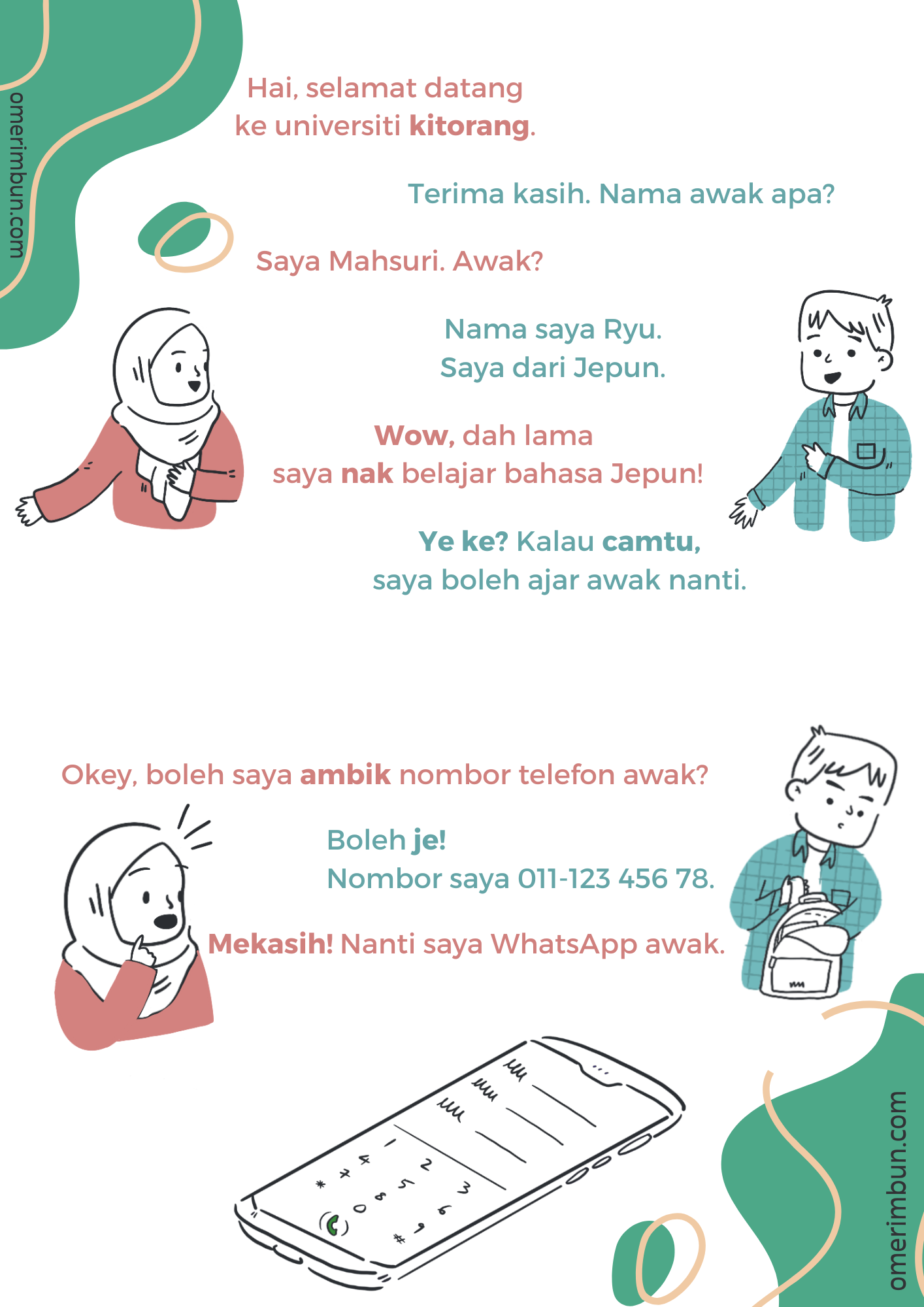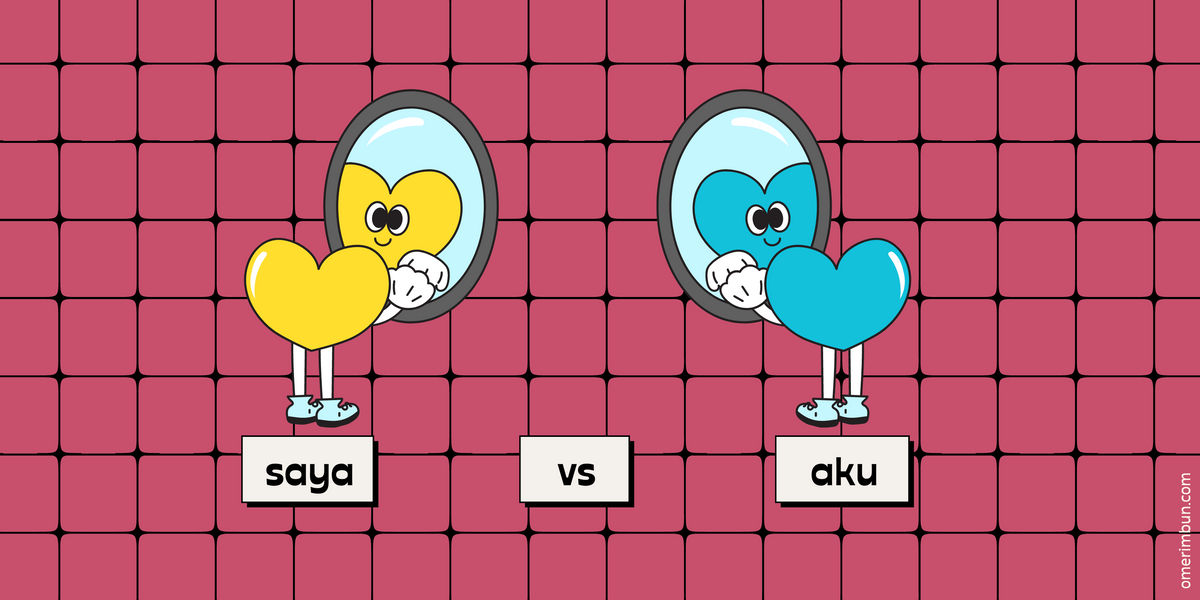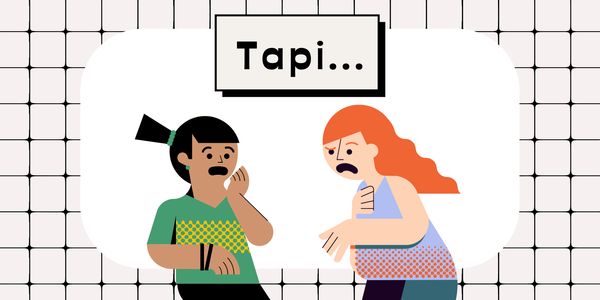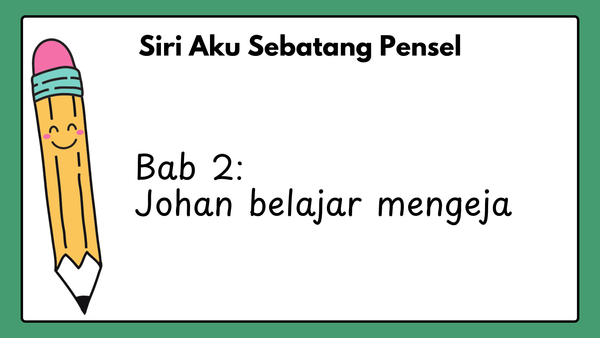Dialogue: Meeting New Friends
Are you nervous to introduce yourself in Malay? Let's learn how to do it by reading this short dialogue.

Standard Malay:
Conversation:
Mahsuri: Hai, selamat datang ke universiti kami.
Ryu: Terima kasih. Siapakah nama awak?
Mahsuri: Saya Mahsuri. Awak pula?
Ryu: Nama saya Ryu. Saya berasal dari Jepun.
Mahsuri: Oh, saya dah lama mahu belajar bahasa Jepun!
Ryu: Yakah? Kalau begitu, saya boleh ajar awak nanti.
Mahsuri: Baiklah, boleh saya ambil nombor telefon awak?
Ryu: Semestinya boleh! Nombor saya 01122455443.
Mahsuri: Terima kasih! Nanti saya hantar mesej kepada awak.
English Translation:
Mahsuri: Hey, welcome to our university.
Ryu: Thank you. What’s your name?
Mahsuri: I’m Mahsuri. What about you?
Ryu: My name is Ryu. I’m originally from Japan.
Mahsuri: Wow, I’ve been meaning to learn Japanese for some time!
Ryu: Really? If so, I’ll teach you then.
Mahsuri: Okay, can I get your phone number?
Ryu: Of course you can! My number is 01122455443.
Mahsuri: Thank you! I’ll text you later.
Vocabulary:
(Shown according to order of appearance in the dialogue).
Selamat datang - welcome
Universiti - university
Kami - our/we
Terima kasih - thank you
Siapa - who
Nama - name
Awak pula - what about you
Berasal - originate
Dari - from
Wah - wow
Saya - I/me
Dah lama - it’s been a long time
Teringin - (have been) wanting
Belajar - learn
Bahasa - language
Iya - yes
Ke - (question marker)
Kalau - if
Begitu - that way
Boleh - can
Ajar - teach
Awak - you
Nanti - later
Baiklah - Okay
Dapatkan - get
Nombor - number
Telefon - telephone
Semestinya - Of course
Hantar - send
Mesej - message/text
Kepada - to
Casual Malay

Explanation of casual Malay vocabulary:
Kitorang - kita orang (we people)
Camtu - macam itu (like that)
Mekasih - terima kasih (thank you)
Nak - hendak (want)
In daily conversation, it is very common for Malaysians to combine two words and shorten them. More often than not, you will hear
"kitorang" (kita and orang, which literally translates to “us, the people)
rather than "kami" when the speaker refers to their collective group of people. Of course, it would be better to use "kami" in formal events such as meetings and such.
Example sentence:
Kitorang nak belajar.
We want to learn.
A word you'll also hear is "camtu" or "camni" (like this).
The usage is not so different than the English meaning, used to exemplify something.
Example sentence:
Awak ajar saya camni.
You teach/taught me like this.
"Mekasih" (or sometimes “maceh”, “aceh”, etc.)
is not really widely used in actual conversation, but more for texting. The meaning, however, is widely known. Those who use it will either come off as friendly, cute or strange, depending on context.
"Nak"
is not a combination of two words, but a shortening of "hendak. This is arguably the most common way of saying to want.
Thanks, wow, okay
Malaysians are known to speak bahasa rojak (a mix of languages) when speaking their mother tongue. In the case of Malay, it is natural to slip English words like thanks, wow, and okay into a mostly Malay conversation.
However there are also English words that wouldn't sound natural in Malay. For example, one would never say:
[X] Saya nak eat.
I want to eat.
A more natural sentence would be using I or you.
I nak makan.
I want to eat.
On the other hand, it is perfectly natural to use the word jogging in a Malay sentence as the word is commonly used to refer to the activity.
Awak? - You?
This method of asking something through a word is similar to the English usage, but in Malay, it is even more common.
For example, we would say:
Makan?
Do you want to eat?
The intonation goes up, which indicates it as a question.
✓ Ambik - ambil
Many words in Malay are not pronounced as they are spelled in daily conversations. While there is nothing wrong with pronouncing this word as "ambil", it definitely sounds more natural to pronounce it as "ambik".
✓ Boleh je
"Je" is shortened from the word "sahaja", which means only. This phrase, however, means "of course". It's very casual
Some of you may know this already, but WhatsApp is an online messaging app that's the most widely used in Malaysia. Hence, it's very common to use it as a verb. It could be pronounced the English way, but it could also be pronounced the Malay way, like Wasap or Wasep.
We'll tackle pronouns in the next post, so stay tuned!






